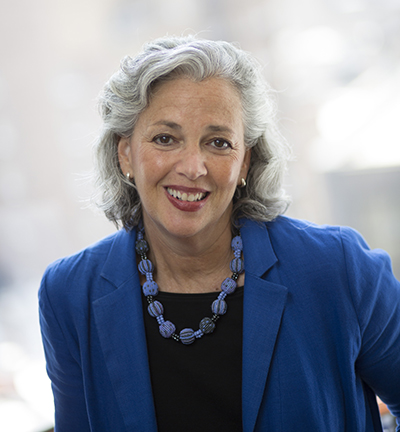American View
Personality
Deborah Lauter Talks Breaking Barriers to Fight Hate Crimes

Deborah Lauter, executive director of New York City’s newly created Office for the Prevention of Hate Crimes, recently visited a public middle school in the Williamsburg section of Brooklyn, along with a local Hasidic rabbi. It was an experiment in breaking down barriers. And it worked better than she had hoped.
Lauter started her new job in August 2019 amid a surge in anti-Semitic violence in the city. Her office—she has six staffers—is dedicated to preventing hate crimes against any minority group, including Muslims, LGBTQ people and undocumented immigrants. The 63-year-old native of San Francisco is an attorney who worked in senior positions for the Anti-Defamation League for 18 years before taking the new job. She and her husband have four adult children.
This interview has been edited for brevity and clarity.
What have the first few months been like?
Probably 80 percent of my time was devoted to anti-Semitism. I met with 50 organizations and had individual meetings with neighborhood leaders. It was definitely a response mode. At the same time, I’m very committed to working with other groups. Now that we’re staffed up, we can do much more outreach on a wider scale.
How are you addressing anti-Semitism?
Education is critically important for the long-term prevention of anti-Semitism. But there’s not one way to fight hate; working at the ADL taught me that. I came up with three prongs of a strategy: community relations, education and law enforcement.
Key is educating people about the consequences of hate and where it can lead. Not only the facts of the Holocaust but looking at where it started, and teaching kids that it starts with name calling, which can lead to discrimination, which can lead to violence. My office is preventative. If we can impact kids early and break down stereotypes so they get to know the people who they see every day but don’t interact with, it will help. We’re doing that through the public schools and neighborhood safety coalitions in Brooklyn’s Williamsburg, Crown Heights and Borough Park areas.
Is the Jewish community being alarmist?
The alarm is justified. That being said, what took me aback was the level of fear and rhetoric of “Are we on the verge of another Holocaust?” What we’re seeing is not state-sponsored anti-Semitism, and I cringed when I saw people juxtaposing pictures of Kristallnacht and a yeshiva’s broken window, which turned out not to be a hate crime. When you look at hate crime numbers in the city, over 50 percent last year were recorded as anti-Semitic, but other groups, like Muslims and undocumented immigrants, are not reporting. It’s skewing the numbers. And of the over 200 anti-Semitic incidents, there were 16 assaults.
So 76 percent was swastika vandalism. We did have a number of harassment incidents on the street but we may not have had as many as people think.
What do you find challenging?
In New York, hate crimes have to have an underlying crime. Yelling “You dirty Jew” at someone on the street is not a crime; it’s protected speech to be a bigot in this country. Unfortunately, hate and its expression have become normalized, even if it doesn’t rise to the level of criminality. That’s part of education, letting people know what are and aren’t hate crimes.
What was it like visiting a public school with a Hasidic rabbi?
I knew it would impact the kids in a positive way, but I didn’t expect the impact it had on the rabbi [David Niederman, head of United Jewish Organizations of Williamsburg and North Brooklyn] and on me. He spoke to fifth- and eighth-graders and had a panel discussion, and we walked the halls, letting the kids ask questions. The kids were so impressive, with a real hunger to know the other and to make things better, to create a culture of respect. It was really a good feeling.
Debra Nussbaum Cohen, author of Celebrating Your New Jewish Daughter: Creating Jewish Ways to Welcome Baby Girls into the Covenant, is a freelance writer in New York City.








 Facebook
Facebook Instagram
Instagram Twitter
Twitter
Leave a Reply